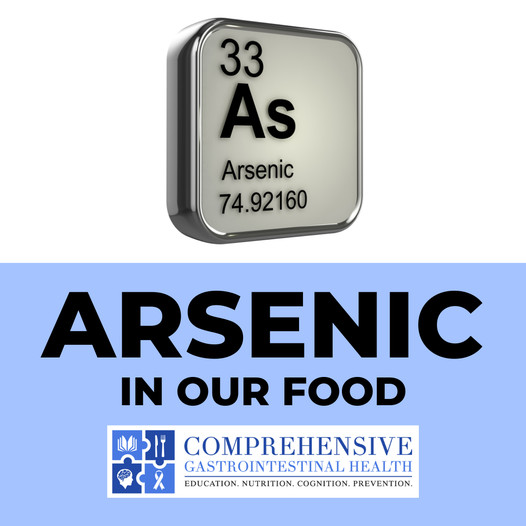Arsenic in Our Food
Arsenic in Our Food
by Claire Allen, RD
Arsenic is often considered a dangerous substance, but it is also a naturally occurring metalloid. As such, humans are often exposed via food, water, air, and soil. The concern arises after long term exposure, which has been linked to various health conditions such as certain cancers, neurodevelopmental problems, and irregularities in blood pressure and blood sugar regulation.
There are two forms of arsenic compounds: inorganic and organic. Inorganic forms include arsenite and arsenate which are considered more toxic to humans. These are often found in the food supply as a result of arsenic-based pesticides. Although these pesticides have been banned for over 50 years, their residues still exist in millions of acres of land. The arsenic threshold is largely determined by the soil location and characteristics of the farming land.
Although many foods may contain arsenic in small levels, rice is likely to contain the highest amounts as a result of its growing environment and location. Rice from the southern areas of the United States likely has higher levels since it is grown in old cotton fields that historically used pesticides high in arsenic. Additionally, brown rice likely contains higher levels of toxicity since arsenic accumulates in the brain. This also affects products derived from brown rice such as rice milk, rice cereals for babies, and brown rice syrup.
Regulations of arsenic in the food supply presents a challenge due to the variability of arsenic in food. This variability also presents difficulties in determining how much arsenic individuals are exposed to in their diet. There are regulations upheld by the EPA and FDA aimed to reduce human exposure to inorganic arsenic. The EPA regulates arsenic levels in drinking water, while the FDA has set regulations for bottled water and recommendations for infant rice cereal and apple juice. Most research indicates that food and drink products do not contain concerning amounts of arsenic levels. Caution is recommended, however, for those that consume rice as a large staple of their diet. Infants and young children are also a population as risk if their diet primarily consists of rice cereals and products.
If you are interested in learning more about how the quality of your food choices may affect your health, schedule a consultation with one of our dietitians at 224-407-4400 or at www.compgihealth.com #arsenic
Information from this post was derived from this article. To learn more and see supporting research please visit this link: https://www.todaysdietitian.com/newarchives/AS21p48.shtml

